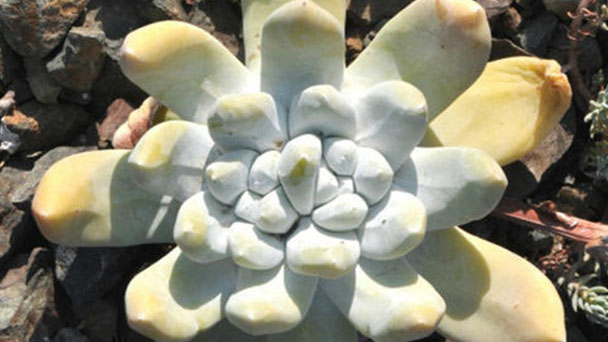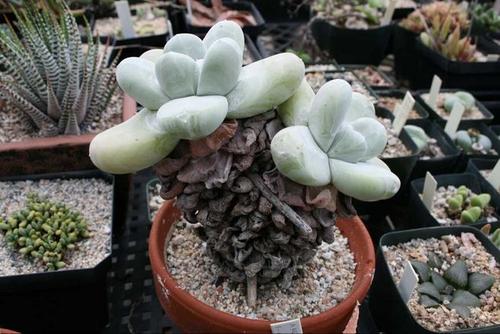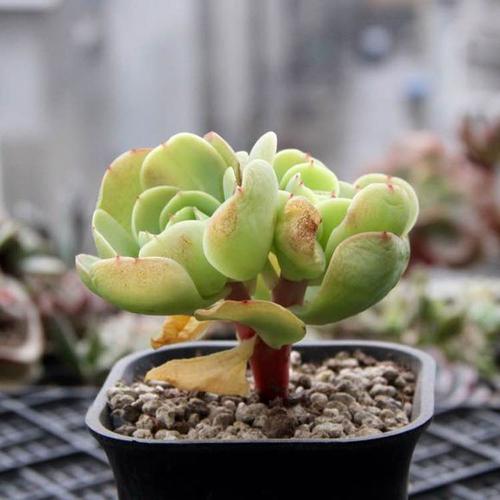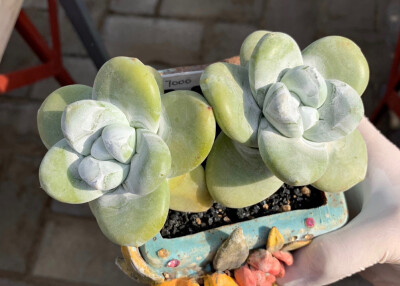Dudleya Pachyphytum profile
Written by Maggie
Jan 12 2021

Dudleya Pachyphytum is a succulent of the Genus Chrysopidae, Nymph cups. Dudleya Pachyphytum is native to The Baja California peninsula of Mexico.
Dudleya Pachyphytum picture

Dudleya Pachyphytum morphological characteristics
Dudleya Pachyphytum stem
Initially erect, later hanging, more than 40 cm long, 2-5 cm in diameter.
Dudleya Pachyphytum Indus
12 -- 22 (-33) cm in diameter, with 12 -- 25 (-35) leaves (up to 55 leaves under cultivation), compact, gasket-like, clustered to 10-20 (-50) heads, 70 cm or more in diameter.
Dudleya Pachyphytum leaf
Leaf is ovate to elliptic, widest at base, apex rounded to broadly obtuse, 5-10 (-13) cm long, 3-5 (-7) cm wide, 15-25 mm thick, pinched, old leaves pale orange. It has 1-4 inflorescences, erect, usually two-branched, stems 20-50 (-70) cm, pinkish, pale rose-colored, base reddish-most obvious.Inflorescences 8 -- 14 cm in diameter, closely spaced with 3 -- 6 cincinny, 2 -- 3 cm long, with 5 -- 12 flowers.Pedicels erect, 2-6 mm.
Dudleya Pachyphytum flowers
The calyx is 5 -- 9 mm;The lobes are 4-7 cm long and 2.5-4 mm wide.Corolla 8-11 mm long, 4-5 mm wide.Petals are erect, elliptic oblong, 2-3 mm wide, white, corolla tube 2-3 mm long, lobes apex slightly curved, acute. Nectary scales are white, carpels 7 -- 10 mm, styles ±1.2 -- 2 mm.

Dudleya Pachyphytum geographical distribution
Dudleya pachyphytum is wild in Mexico baja California Peninsula. Artificial cultivation occurs in many parts of the world.
Dudleya Pachyphytum Care
Dudleya Pachyphytum prefers warm, dry and sunny environments, not resistant to cold, semi-shade and drought, afraid of moisture and strong light exposure, and pays attention to proper shading and ventilation in summer. In the growing season it can be full sunshine, and in winter it can be placed in the indoor light enough place for maintenance. At ordinary times, keep the basin soil moist, avoid rain and water. You can go without water in winter. It is safe to keep the soil dry during the winter.
Dudleya Pachyphytum method of reproduction
Dudleya Pachyphytum can be propagated by sowing and decapitation, or by taking side shoots for cuttage.

Latest Updated
- Benefits of Bugleweed - 7 Science-backed Health Benefits
- Bugleweed Dangers & Side Effects - Is It Poisonous?
- How to Plant Evergreen Trees - What You Should Know
- When to Plant Evergreens - Grow Guide for Evergreen Trees
- 12 Wonderful Evergreen Shrubs for Your Garden
- 12 Popular Evergreen Plants with Pictures for Beginners
- When And How To Prune A Lilac Bush Like a Pro
- How to Grow & Care for Lilac Vine (Hardenbergia Violacea)
- Japanese Lilac Tree (Syringa Reticulata) Care & Propagation Guide
- Shumard Oak Pros and Cons - What to Know
Popular Articles
- Winter maintenance of Antirrhinum Majus
- How to Grow Terminalia Mantaly Tree
- How to Grow and Care for Crossostephium Chinense
- How to grow Antirrhinum Majus in spring
- Peristeria Elata (Dove Orchid) Profile: Info & Care Guide
- Underwatered Snake Plant (Sansevieria Trifasciata) - Signs And How To Fix
- How to Care for Brazilian Jasmine Plant (Mandevilla Sanderi)
- How to Grow & Care for Graptopetalum Purple Delight in Summer
- Rosa Chinensis (China Rose): Plant Growing & Care Tips
- How to Care for Baby Sun Rose (Aptenia Cordifolia)